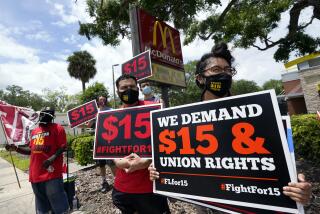Will United Buyout Get Off the Ground? : Employee owners: Skeptics say they’ll pad benefits and skimp on capital investment, but experience tells otherwise.
- Share via
On Tuesday, shareholders of United Airlines are scheduled to vote to approve or reject an employee buyout of their corporation. The transaction has attracted a great deal of attention both because of its size--it would be the largest employee-owned company in history--and its structure--a majority of its stock would be held by workers who are also members of labor unions. The novelty of the proposed United arrangements has begun to provoke considerable attention.
Lee Iaccoca is one prominent skeptic. In a recent Business Week article, he is quoted as saying, “Somebody’s crazy. It can’t work . . . what do you think will happen when it’s a choice between employee benefits and capital investment?” Iaccoca’s skepticism needs to be taken seriously. But it also overlooks certain details. The United transaction has been carefully structured to include an independent board of directors, composed of respected financial and business professionals like Paul Volcker, former chairman of the Federal Reserve Board, and Joseph Vittoria, chief executive officer of Avis, perhaps the most prominent and successful employee-owned company to date. Even in later years, however, when workers at United may come to exercise increased influence over the composition of the United board, that influence will not necessarily translate into unrealistic wage and benefit demands.
Evidence from the existing employee-owned corporate sector, in fact, points in another direction. Experience shows that most employees, but particularly mid-career worker/owners who are counting on continued employment at a viable company, actually serve as an internal check against those who would use ownership to raid the treasury. Employee owners do not typically suffer from the “short-termism” associated with management of most publicly traded companies. Research also shows that if ownership is intelligently used by company management as a foundation to help launch sincere efforts at participation, employee-owned companies can enjoy clear and significant productivity and profitability improvements.
Fiscal conservatism on the part of workers is not restricted to the collective-bargaining table. At a recent employee ownership conference, Vittoria spoke of a new practice Avis has instituted, allowing employees at its rental facilities (as opposed to customer-service professionals at headquarters) to dispense vouchers for complimentary rentals to customers who have experienced problems with Avis’ service. At first, many in management feared that the workers would give away the store. The results are in. Avis employees, with their share value in mind, dispense fewer complimentary vouchers than their counterparts at headquarters. However, because employees respond on the spot to actual problems, the company continues to maintain the highest levels of overall customer satisfaction in its history.
The financial side of the Avis story is also compelling. Since the 1988 sale to its employees, shares of Avis’ privately held stock have appreciated in value 344%--from $5.22 per share to a current $17.96. Something unusual is going on here.
Often associated in the public mind with distress buyouts of rusting steel mills (many of which have actually turned successful), employee ownership is making inroads into key sectors of the American economy. As a result of elaborate, tax-advantaged legislative architecture for employee stock-ownership plans, or ESOPs, more than 10,000 companies now count their employees as substantial shareholders. In about 2,000, employees hold a majority stake.
Despite the success stories, in a transaction as large and complex as United’s there should be plenty of room for caution. Culture change, a notoriously slow process in itself, needs to take place at all levels within the new United, including within each of its unions. Adversarialism at the bargaining table needs to be replaced by open debate about the costs and benefits of various strategic options. The focus of debate needs to be external, toward the market, not just internal, toward one another.
The factors in need of change at United are the same one hears at every conference on the future of the American workplace. Add to those factors the challenge of sorting out the meaning of shared ownership and it is easy to conclude that the needed changes will be difficult to achieve. Why should the new United fare any differently than other corporations attempting cultural change? The answer is fairly straightforward. The incentives are rational. At the new United, the majority share of the fruits of collaborative effort will be shared with those who do the collaborating--the employee owners. And Iaccoca notwithstanding, employees are smart enough to understand the long-term potential of employee ownership.
More to Read
Inside the business of entertainment
The Wide Shot brings you news, analysis and insights on everything from streaming wars to production — and what it all means for the future.
You may occasionally receive promotional content from the Los Angeles Times.










